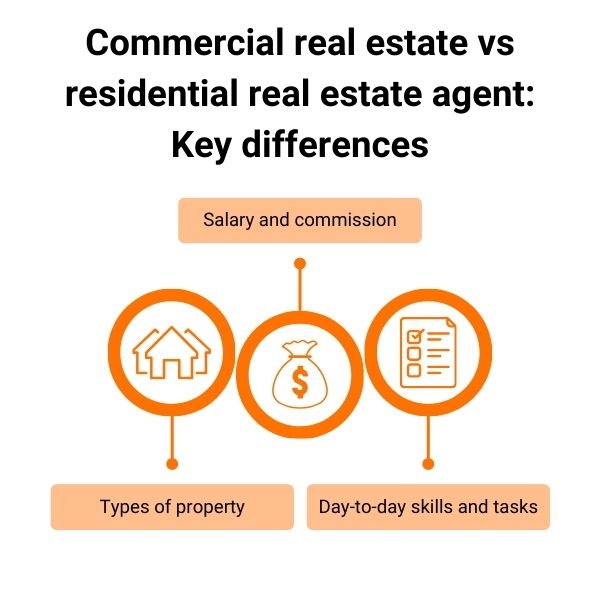When it comes to real estate agents in Australia, there are two very different career pathways that aspiring agents have to consider – commercial and residential.
According to the latest data from IBIS World, there are 8,637 registered commercial real estate businesses in Australia vs. 33,662 residential real estate businesses. So, why are there so many more residential estate agents, and what are the main differences between these two pathways?
The average real estate agent salary in Australia is around $80,000 annually, with commercial agents more likely to earn six figures. Add commissions and bonuses to that, and commercial real estate starts to sound more fruitful.
It’s not just about the money, though. Choosing between a commercial vs residential real estate career comes with other considerations and caveats.
In this article, we’ll take you through the differences between commercial real estate vs. residential real estate agents and answer some key questions along the way.
Table of contents:
- Commercial vs residential real estate licence
- Key differences between the two careers
Are there different licence requirements for residential vs. commercial real estate agents?
No – there aren’t different licenses required for commercial and residential real estate agents. In Australia, a Class 2 licence allows you to buy and sell residential and commercial property. However, where requirements may differ is in additional skill sets that depend on the state or territory.
Students in all states except NSW and the ACT can obtain their real estate licence and work in commercial real estate by completing a Certificate IV in Real Estate Practice (CPP41419). However, NSW and ACT students interested in the commercial industry are also required to complete several additional subjects pertaining to commercial real estate, as established by NSW Fair Trading.
If you’re not sure whether you’re more suited to residential or commercial real estate, you don’t have to worry about different licences. Just check your state’s requirements for any additional subjects you should sign up for if you’re interested in selling commercial property.
Commercial real estate vs residential real estate agent: key differences
So, if the licenses are the same, what are the main differences between the two, and how do agents typically decide which route to take? Here are the main points of difference:
Types of property
Residential agents specialise in selling and leasing residential property. That means houses and apartments. There is always demand for residential properties, so residential agents are lucky in that they can rely on a pretty steady workflow.
Commercial real estate agents sell and lease warehouses, shopping centres, office spaces, hospitals, and other business premises. While commercial real estate depends on the economic market of the area, sales are often higher, but can also take longer.
Salary and commission
The average salary of commercial vs residential real estate agents shows us that commercial real estate agents often make more than the average residential agent. Due to the high sale figures, commissions can also end up being much higher too.
Commercial sales often have a longer sales process, so this may be one of the reasons that some agents prefer to work in residential property.
Day-to-day skills and tasks
Commercial agents will often be dealing with businesses, managers, and a wider pool of contacts each day, which makes for a demanding schedule.
While residential agents have the job of finding a suitable home and convincing the client of its worth, commercial real estate sales involve more parties, paperwork, and information. In some cases, commercial agents tend to work regular 9–5 hours in formal, business-like environments, while residential agents can take on a more casual, flexible work style (but are more likely to work Saturdays!).
Is it common for real estate agents to move between residential and commercial?
As we mentioned earlier, if you attain a real estate licence in Australia, you can sell both commercial and residential real estate (just check your state’s requirements first!).
However, it’s not all that common to see agents move between the two fields, perhaps because of the many disparities between the two working landscapes.
Commercial vs residential real estate agent careers: pros and cons
Commercial real estate agent pros
- Higher commission and salary
- Stable schedule
- Larger skill set and knowledge base
Commercial real estate agent cons
- More demanding workdays
- Additional training and study may be necessary
- Less demand, slower sales turnover
Residential real estate agent pros
- Faster, more straightforward sales turnover
- Consistent demand and large client pool
- Flexible schedules
Residential real estate agent cons
- Lower commissions and salary
- Requires independent work
Final thoughts
Generally speaking, most agents choose to specialise either in commercial or residential. The pathway that you choose will come down to the career you’re after, and what you enjoy doing each day. Some prefer residential due to the exciting and social aspect of the job, and others prefer commercial for the corporate and business elements.
Whether you’re looking to step into residential or commercial real estate, Entry Education offers the real estate courses that will get you there. If you are in VIC, sign up for the Certificate IV in Real Estate Practice (CPP41419), which will get you the licence you need to sell commercial and residential property.
As the best RTO for real estate training in Australia, there’s no better place to get your real estate licence and discover whether commercial or residential work is right for you.





















